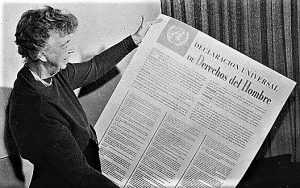Right of petition
The right of petition is one of the most valuable tools granted by the national constitution to individuals of a country so that, they have the possibility of demanding information and answers from the administrative authorities on a certain topic of interest and if these institutions do not comply with the petition, they would be incurring in an administrative fault that could become punishable. This type of right is enshrined in the national Constitution and it is through this right that citizens are empowered and given the possibility to have the option of submitting requests and petitions to the authorities, so that they are given information on situations of general and/or particular interest.

Related topics
Constitutional right, criminal procedural law, labor law, positive law, social law, family law, private law, Roman law, natural law, public international law
What is the right of petition?
It is the right of every citizen, either individually or legally, as an organization or group, to be able to request or complain to the authorities, generally governmental, about reasons and responses of public interest.
Abut the right of petition
The right of petition consists in the capacity and the right that people have to be able to present before governmental entities or before certain individuals, the petition in order to have a certain situation explained to them. It also consists of the obligation by the government to comply with such a request, which can be general or particular.
The purpose of the right of petition
The right of petition is useful in the following cases:
- To be able to complain about irregular conduct by a public official or an employee of a private company providing a public service to the public.
- To be able to make claims for the unjustified suspension of a public service or because it is given to the customer inefficiently.
- For individuals to have the opportunity to express their opinion regarding one or more applicants about a particular public entity.
- To be able to request information on how a public entity acts, on public documents, or on copies of documents found in a public office.
Characteristics
The main features of the right of petition are as follows:
- It is part of democracy.
- Helps secure other rights.
- It increases freedom of expression.
- It is inalienable, inalienable and imprescriptible.
- It cannot be violated.
- It is a right recognized by law.
Types
Within the different legal systems of the countries, three different types of right of petition can be observed more frequently, which vary depending on the topic to be dealt with. These are as follows:
- Right of petition for information: this is when some type of information is requested on one or several facts that correspond to the knowledge of the nature of the requested entity.
- Right of Request to formulate consultations: this request is made in order to obtain an opinion on a fact within the competence of the administration.
- Right of Petition of complaint: it is the petition that makes that an entity realizes an irregular situation in the operation of its services.
History
There is actually no exact date when the right of petition was initiated. Some historians think that it comes from the political constitution, but it is believed that it actually comes from Europe, mainly in the monarchies and tyrannies of Asian type.
A curious fact is that during the late medieval practice, it was a normal custom for different kingdoms for subjects to address the king to make requests for graces or for reparation of grievances.
For some other researchers, the right of petition originated in England, and was practiced in the same way by making petitions to the king.
In the 13th century, subjects had the ability to turn to the monarch to give thanks and this was originated by the supreme judicial instance or the king, and the moral and religious duty that was treated with pity for the subjects.
Right of petition by country
Mexico
This right can be found in article number 8 of the Mexican Political Constitution. Public officials and employees shall respect the right of petition, provided that it is formulated in writing, in a peaceful and respectful manner. All petitions must have the written agreement of the authority to which they are addressed, which must be made known to the petitioner as soon as possible.
Spain
In Spain it is a fundamental right whose ownership corresponds to any natural or legal person, regardless of nationality, and which is found in Article 29 of the Constitution and developed in Organic Law 4/2001. It is a right that can be exercised individually or collectively, either to address the public authorities or to inform them of certain facts, or to demand their intervention, or both at the same time.
Importance
The right of petition is very important for citizens because it is the constitutional guarantee that can ensure that the state must respond to any type of petition by the people, provided that it is made in writing and in a respectful manner. It is considered one of the pillars of the ideal of democracy, government or the people for the people.
How to make a right of petition
To be able to make a right of petition correctly, it must contain at least the following aspects:
- The designation of the authority to which the right of petition is addressed.
- Your name and last name as applicant and that of your representative, where applicable, your identity card and your address.
- The subject of your request.
- The reasons that you have to elaborate the right of petition.
- The evidentiary documents that accompany your right of petition.
- Your signature as a petitioner.
How to respond to a right of petition
The response given to the right of petition must be clear and must give an adequate and effective solution to the doubt that has been presented, at least, must clarify the doubts that have been presented in the petition. It must be a timely, relevant and precise response. You cannot give vague answers that evade information and do not provide the person requesting it with information about the situation.
Examples
An example of a request would be as follows:
Lucas Sanchez, in my own right and on the basis of article 8 of the Political Constitution of the Mexican States, indicating as domicile for notifying the written agreement that falls to my request the one located at 123 Colonia Avenue … I come to request: To make known to me the number of collaborative agreements entered into by the institution in your charge as well as the persons with whom such agreements were entered into and the object of them.
How to cite this article?
Briceño V., Gabriela. (2019). Right of petition. Recovered on 3 January, 2025, de Euston96: https://www.euston96.com/en/right-of-petition/









